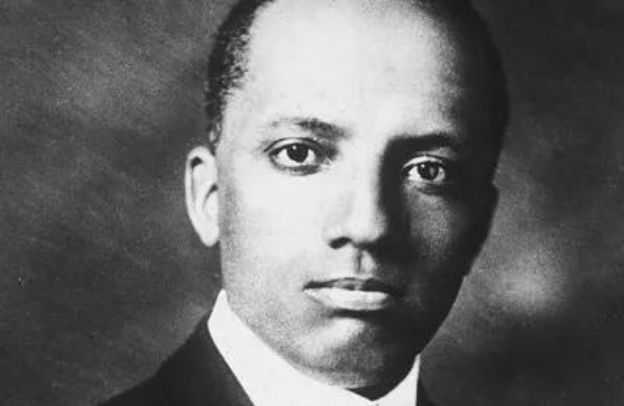Carter G Woodson, American Historian, Author and Journalist – 1875 To 1950

Carter G Woodson was among the few Blacks who made waves in the later parts of the 19th century up to the 20th century. Known as the “father of Black history,” Dr. Woodson embarked solely on unearthing the history of the African diaspora, especially those in the United States. Resolved in his vision, he founded the Association for the Study of African American Life and History (ASALH) and “The Journal of Negro History” in 1916.
Want to learn more about storytelling? Start by downloading the first chapter of The Storytelling Mastery for Businesses.
Born to slave parents, Dr. Woodson once worked in coal mines of West Virginia where he earned tips for subsistence. His rigorous efforts and passion for elevating the history of all Blacks in the U.S. to a point of recognition prompted Woodson to enroll in school in the later years of his life.
This enabled him to wade through several academic processes until he attained his Ph.D. degree, making him the second Black man to have attained such a degree after W.E.B Du Bois… As an author, journalist, and historian, Dr. Woodson lectured in various Black colleges across the United States, earning him far and wide recognition from both blacks and whites.
Check out our Life & Legacy Series to read more about similar stories.
His strenuous efforts in richly spreading the history of Black Americans led him to launch what was known as “Negro History Week,” which was later changed to Black History Month,” leaving a remarkable imprint in the lives of millions of Blacks.
Dr. Woodson’s Early Life As A Black Child
Carter Godwin Woodson was born on December 19, 1875, in New Canton, Virginia. The fourth of nine children his dad, James Henry Woodson, was a ‘hired slave’ known as a rebel who later fled to join the Union Army after his rebellious act against his owner his mother was Anne Eliza (Riddle) Woodson was fortunately taught how to read and write by her mistress during her days as a slave.
A little after Woodson’s birth, his father who was resolute on creating a better life for their family purchased a small farmland and migrated his family to West Virginia, where they collectively worked on the farmland, but to supplement their family’s income, Woodson worked in New River Gorge coalfields.
Considering the difficulties and lack of opportunity for Blacks in society at the time, Woodson was hindered from attending school right from childhood until he was a teen.
However, Woodson and his siblings were able to learn basic reading and writing, credit goes to their maternal uncles who were adept in the field. Although, Woodson groomed himself into an avid reader from thereon.
Having grown into a promising teen, Woodson and his brother resolved to attend a High School and they were enrolled into Fedric Douglass in Huntington, where Woodson, in spite of it being his first time in school, did unspeakably good he was able to finish four years course under two years, earning his first certificate in 1897.
Woodson diligently advanced his education, delving into the realm of knowledge at Berea College in Kentucky, where he ardently pursued and successfully obtained his bachelor’s degree in literature in the year 1903. Post his academic triumph at Berea, Woodson dedicated his skills and expertise to the service of the United States government, taking on a pivotal role as a supervisor in a school in the Philippines that fell under the jurisdiction of the US government.
Upon his return to the United States, Woodson’s academic journey continued to flourish as he sought another degree at the esteemed Chicago University. He zealously pursued and attained both a bachelor’s and master’s degree at Chicago University, solidifying his commitment to the pursuit of academic excellence. Undeterred by his already impressive educational background, Woodson set his sights on the prestigious Harvard University.
The culmination of his academic endeavors was realized in 1912 when Woodson, through unwavering dedication, earned a Ph.D. degree from Harvard. This distinguished achievement catapulted him into the annals of history, marking him as the second Black American to attain such an esteemed academic credential, following in the illustrious footsteps of W.E.B. Du Bois.
A Look Into His Career Life
Having graduated with a sound result from Harvard University, Dr. Woodson became highly sought after because of his wealth of knowledge. However, his passion for transferring knowledge, especially to blacks led him to take up lecturing jobs. Therefore, Dr. Woodson thought in both public and college schools. He helped groom people into research works and sharpen their knowledge.
Recognizing the undervalued contribution of Black Americans in shaping American society, Dr. Woodson underwent a profound transformation in his vision. He wholeheartedly committed himself to the pivotal tasks of advocating, writing, and narrating the rich histories of Black Americans within the societal framework. This unwavering dedication rightfully bestowed upon him the well-deserved nickname the “Father of Black History.”
At the zenith of his career, Dr. Woodson achieved a significant milestone by ascending to the position of dean at the School of Liberal Arts and concurrently assuming the role of Head of the Graduate Faculty at Howard University during the period spanning 1919 to 1920. This remarkable achievement not only underscored his academic prowess but also solidified his influential role in shaping the educational landscape.
Further amplifying his impact, Dr. Woodson extended his administrative expertise as he assumed the position of Dean at the West Virginia Collegiate Institute, which has since evolved into the institution known as West Virginia State University. This dual leadership role exemplified his commitment to advancing education and fostering a deeper understanding of Black history.
His undeterred zeal to thrust into historical books the efforts and immense contributions of Black Americans in American society led him to co-found the Association for the Study of African American Life and History, Inc. (ASALH). While running the association, Woodson delved into writing journals and articles about Black American history.
In 1922, Woodson, fueled by dedicated efforts and tireless work, acquired a three-story building located at 1538 Ninth Street, N.W. in Washington, D.C. Demonstrating his commitment to the cause, he not only made this space his residence but also strategically designated the first floor as the headquarters for the association he had founded.
This authentic move showcased Woodson’s hands-on approach, as he personally inhabited the third floor, emphasizing his direct involvement in the day-to-day operations of the organization.
In 1916, Woodson initiated the academic publication, The Journal of Negro History, showcasing his foresight in recognizing the need for a dedicated platform to document the historical narrative of Black Americans. His commitment to amplifying underrepresented voices continued in 1937 with the establishment of The Negro History Bulletin.
Moreover, in 1921, he laid the foundation for Associated Publishers, Inc., an innovative publishing company. This venture was distinctive for its commitment to publishing works often overlooked by mainstream publishers, including writings by Black scholars and women, thus contributing significantly to the preservation of African American and African Diaspora history.
Popular Books From Carter G Woodson
Dr. Woodson wrote several books about Black history and popular amongst them is ‘Mis-education’ where he criticized Western indoctrination and how it grooms racism. Other works of his include:
- A Century of Negro Migration (1918),
- The History of the Negro Church (1921)
- and The Negro in Our History (1922).
Death And Legacy Of Carter G Woodson
Carter G. Woodson passed away on April 3, 1950, leaving behind a profound legacy that continues to shape the study of African-American history. His death marked the end of a remarkable life dedicated to promoting the importance of Black history and culture.
Woodson’s legacy is most notably embodied in the establishment of Negro History Week in 1926, which later evolved into Black History Month. This enduring tradition has become a vital platform for recognizing and celebrating the contributions of African Americans throughout history.
His vision aimed not only to acknowledge the achievements of Black individuals but also to foster a more inclusive and accurate understanding of American history.
Want to learn more about storytelling? Start by downloading the first chapter of The Storytelling Mastery for Businesses.





